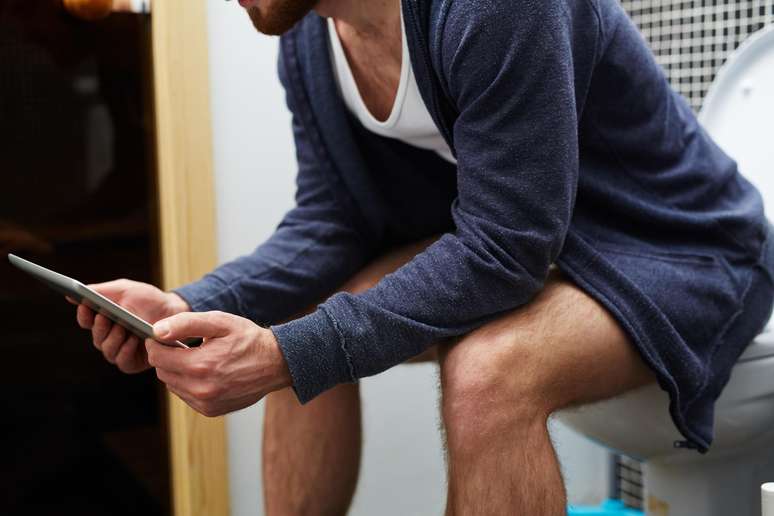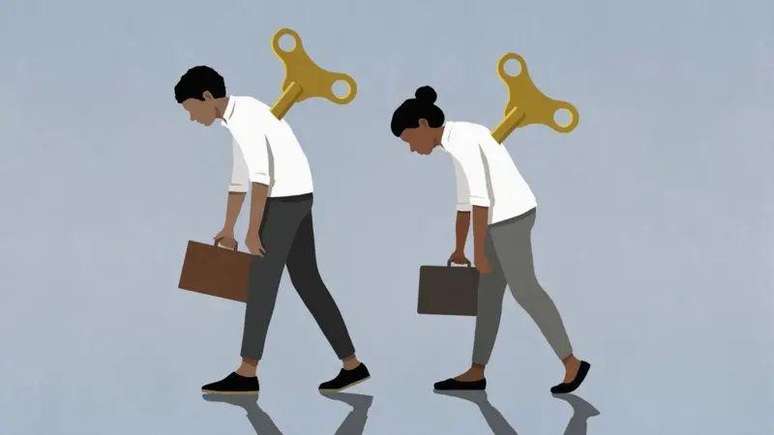Spending a lot of time in the bathroom can increase the risk of hemorrhoids and weaken the pelvic muscles; cell phone use improves the habit
Bringing your cell phone to the bathroom has become a common habit that can prolong time spent sitting on the toilet and cause serious health problems. In addition to increasing the risk of hemorrhoids, the habit can weaken the pelvic muscles, as explained by Lai Xue, colorectal surgeon at the University of Texas Medical Center in Dallas (USA).
“When patients come to the office with complaints, one of the main issues we explore is prolonged time spent in the bathroom,” Xue says in a CNN report.
Why is spending too much time in the bathroom a problem?
According to Farah Monzur, assistant professor of medicine and director of the Center for Inflammatory Bowel Disease at Stony Brook Medicine in New York, the ideal bathroom time should be 5 to 10 minutes.
Sitting for prolonged periods of time can cause problems due to the action of gravity. According to Xue, the open position of the toilet seat compresses the buttocks and places the rectum in a lower position, increasing pressure on the blood vessels.
“It’s like a one-way valve: the blood enters, but has difficulty returning,” explains the doctor. This pressure can lead to swelling of the veins around the anus and rectum, encouraging the development of hemorrhoids.
The dangers of forcing bowel movements
Forcing bowel movements during prolonged toilet use can also make the problem worse. Many people lose track of time when using their cell phones in the bathroom, which contributes to overexertion. This behavior can weaken the anal muscles, increase the risk of hemorrhoids, and even cause rectal prolapse, when part of the rectum protrudes from the anus.
Furthermore, the pelvic floor muscles, which are essential for intestinal function, are also damaged. The constant pressure from this prolonged position can strain these muscles, affecting your ability to effectively coordinate bowel movements.
In some cases, persistent difficulty with bowel movements can be a sign of conditions such as irritable bowel syndrome, Crohn’s disease, or even colorectal cancer. “If a colon tumor gets large enough, it can block the passage of stool, causing constipation and bleeding,” explains Lance Uradomo, a gastroenterologist at City of Hope Orange County in California.
The American Cancer Society has reported an increase in colorectal cancer cases in people under 55 since the 1990s. This year, the estimate is 106,590 new cases of colon cancer and 46,220 new cases of rectal cancer in the United States.
If symptoms of constipation or prolonged toileting persist for more than three weeks, Monzur recommends consulting your doctor. Depending on the severity, the patient may be referred to a gastroenterologist or colorectal surgeon for a detailed evaluation.
How to avoid problems?
To avoid these risks, experts recommend leaving cell phones, books and magazines outside the bathroom. “Don’t go in with the idea that you’re going to be there for a long time. Make the bathroom an uninteresting place,” advises Monzur.
If you don’t have a bowel movement within 10 minutes, Xue suggests leaving the bathroom, walking to stimulate your intestinal muscles, drinking water and consuming foods rich in fiber, such as oats and beans. Hydration and a balanced diet help soften stools, facilitating effortless evacuation.
Source: Terra
Ben Stock is a lifestyle journalist and author at Gossipify. He writes about topics such as health, wellness, travel, food and home decor. He provides practical advice and inspiration to improve well-being, keeps readers up to date with latest lifestyle news and trends, known for his engaging writing style, in-depth analysis and unique perspectives.









